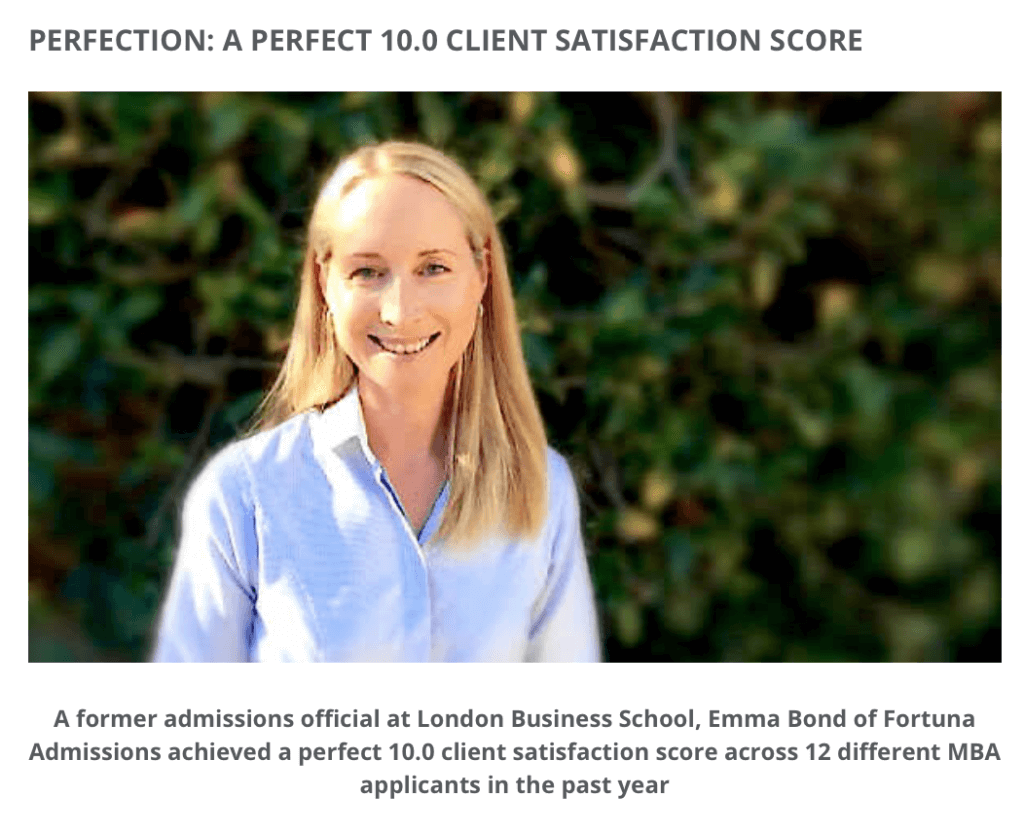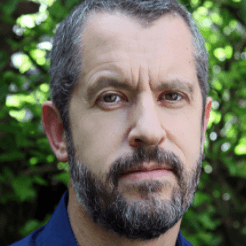5 Strategies for MBA Admissions Success
February 09, 2023 |
Applying for the MBA represents more than the next step in your career, but the opportunity to pause amid the velocity of your fast-paced life and enter a meaningful process of self-discovery.
It’s an invitation to really think about where you want to see yourself five to 10 years, what matters most to you, and what you have to offer in both the classroom and in the wider community. If you bring awareness to the process of applying, and not just the outcome, the benefits will extend far beyond an acceptance letter.
That’s why having an experienced MBA admissions coach at your side is such a valuable asset for so many aspiring applicants, particularly for those who set their sights on a top 20 school.
“Many clients work with Fortuna to gain admission to their dream schools, and in the process, realize they’ve taken a journey of self-discovery with a trusted team of advocates,” says Fortuna’s Jenifer Raver, who was named among the Top 20 Admissions Consultants by Poets&Quants – along with Fortuna’s Karen Hamou and Michel Belden. Jenifer made the same MBA application journey thanks to invaluable support from a small group of people, including her brother and friends in business school. “Without this group of people that became my de-facto coaches, I’m not sure I would have had the courage to apply to Wharton Lauder. I’m still very grateful for their positivity, wisdom, and advice during the very stressful application process.”
While at school, Jenifer served on Lauder’s Admission Committee and later as a Wharton alumni interviewer. Jenifer has also worked in various roles within higher ed over the last 18 years so she can help demystify the application process for others. However, she doesn’t hesitate to reach out to Fortuna’s team of more than 40 expert coaches on behalf of her clients. “When I need advice, specialized expertise, or a second opinion for a client, I tap my trusted Fortuna colleagues,” says Jenifer. In this way, clients have access to the Fortuna team’s wealth of knowledge and experience in a confidential way.
Hidden Benefits of Having An MBA Admissions Consultant
From written essays to the admissions interview, the MBA application process is rife with imposing questions designed to surface your unique traits, motivations, values, and career aspirations. Stanford GSB’s iconic admissions essay, for example, wants to know, “What matters most to you and why,” while Kellogg asks, “What values are important to you and how have they influenced you?” Answering these and other such questions in a way that’s credible, compelling, and concise to an MBA admissions officer means first conjuring that clarity of purpose for yourself.

Injecting the b-school application process with this level of self-discovery is something my Fortuna Admissions colleagues are passionate about, and their level of expertise as former MBA admissions gatekeepers is unrivaled.
P&Q also lauded Fortuna’s Emma Bond, former Associate Director of Admissions at London Business School, for achieving a perfect 10.0 score on client satisfaction from a dozen different clients last year. (View some of Emma’s rave reviews.)
Because it’s never too early to start preparing a great application for Round 1 in the fall, I solicited their advice on why to start the application process early and how best to set yourself up for admissions success.
5 Top Tips for MBA Admissions Success (& Why Start Now)
1. Surface what makes you unique.
“Before diving into the application process, I am a huge proponent of doing some reflective work. In my experience, using self-assessment tools such as CliftonStrengths helps candidates clarify their passions, purpose, and ‘personal brand,’” says Fortuna’s Sharon Joyce, former Berkeley Haas Associate Director of Admissions. “Generally speaking, self-assessment tools include activities that illuminate values, skills, strengths, cultural and personal work style preferences, and communication styles. Guiding prospective students to define their strengths, affinities and talents lay the groundwork for powerful application materials.”
In addition to her years of admissions experience with Berkeley Haas and Fortuna, Joyce is a certified CliftonStrengths coach and uses the assessment to ground candidates in an understanding of what makes them unique and to uncover new angles in their story to distinguish their application from others.
One of Sharon’s recent clients, an engineer with an overrepresented profile, discovered “relationship-building” among his top five strengths. This awareness inspired a new conversation about the way he manages teams, making connections to his leadership style and uncovering stories he never thought to share. By lifting this up in his overall narrative, he was able to share his story from a unique perspective and leverage it as something extraordinary. “I can see students having these ah-ha moments – I am good, I do bring this,” says Joyce. “To paraphrase a recent client, it provides users with a clear look at themselves which can be difficult to accomplish on your own.”
2. Ritualize perspective-taking.
The relentless pace of striving and achieving can leave little room for sincere self-reflection. If you’re among the excellence-driven wunderkinds who have attained a certain level of success early in your career, it’s not uncommon to simultaneously suffer from “imposter complex.” Take a big step back to consider where you are in your life, and why are you choosing this moment of your career to pursue this type of degree. Drop into being excited, versus anxious, as you enter this process.
“Many of us don’t have a habit of self-reflection, making the idea feel awkward or challenging. You might feel unsure about how big you can dare to dream or uncomfortable thinking too far ahead,” says Fortuna’s Caroline Diarte Edwards, former Director of MBA Admissions at INSEAD. “Beginning a process of deep reflection several months ahead of application deadlines gives you both time to get introspective and to ritualize it as routine. Insights may not arrive immediately, but just voicing the questions and inviting the answers can elicit unexpected connections. The answers may appear suddenly or at odd moments – reading a blog, commuting to the office or gazing through the cabin window of an airplane.”
3. Reject the tyranny of the ‘perfect profile.’
The question isn’t what do business schools want to hear, but what do I need to tell them? Too many applicants waste precious time speculating what admissions officers want to hear and building a narrative to fit the ‘perfect profile.’ “Having passion and a sincere conviction about what you’re doing translates so much better to a standout MBA application than crafting what you think the school will be looking for,” says Fortuna’s Judith Silverman Hodara, former head of Wharton admissions.
It’s no small feat to articulate who you are and why you’re worthy. You’ll be judged, and it’s subjective, but delivering your authentic narrative is about daring to get personal. “When you take the risk to be vulnerable, it inspires a human connection, and it’s so much more appealing to read,” says Fortuna’s Karla Cohen in her article, What Harvard Business School Really Wants. “The more personal you can be in terms of why you do what you do, the more interesting and memorable you’ll be. Because so few people are. Few people are honest, and fewer are vulnerable in the process of storytelling. But there is something so powerful about the truth when you read it – it hits you.”
4. Know how others perceive you.
It’s also incredibly useful to get a deeper understanding of how you’re perceived by others. Beyond initiating a formal 360, reach out to coworkers, friends, and family to solicit their unvarnished comments. Start by asking how they might describe your unique talents and assets, or what character traits you exemplify. Listen to what they have to say about your blind spots and weaknesses, too. Ask them what they picture you doing in five years, and in 10.
“What you garner from this may surprise you, and it can be equally affirming and informative,” says Fortuna’s Curtis Johnson, a Wharton MBA alum, in his article on brand building and storytelling for the MBA. “Parsing through the differentiations between how others perceive you and how you view yourself advises your capacity to be authentic.” What you stand to learn may also supply invaluable material for your application and insight on the ‘personal brand’ you think you’re projecting.
5. Start asking great questions.
Create a smart list of relevant questions, such as, what talents and strengths do you bring, how are you prepared to leverage them in service of your highest ambitions? How will business school help you access your greatest potential? Not just make you a better marketer or hone your wicked finance skills, but how will the degree support your leadership development? Connecting your strengths to your story with sincerity and substance is way more appealing to the top schools on your list. There’s no depth to, ‘Oh, I’m a perfectionist.’ (Cue eye roll.)
“What’s compelling to the admissions committee is what you’ve learned from your experiences, and how they’ve grown your personal and professional ability to imagine, act and lead,” adds Judith. “To get there, consider the circumstances, defining moments, and pivot points that have shaped you, the achievements you’re most proud of, and the challenges you’ve faced and overcome along the way.”
It can seem impossible to find the time (and presence of mind) to explore such questions given the breathless pace of life, especially for high-performing, fast-track professionals. Necessity has conditioned most of us to be more connected to our external devices than our interior lives, more devoted to multi-tasking than mindfulness. Yet that’s precisely what the MBA admission process is trying to extract from you. The sooner you start your personal journey of introspection, the more you will enjoy the process, and the greater your chances of admissions success.
“Dare to have a little fun,” Sharon likes to say. “There is no right story other than your own. And the person best positioned to tell that story is you.”
Let’s Get You In.
Fortuna Admissions is a dream team of former MBA Admissions Directors and Officers from the world’s top business schools. With our unparalleled collective expertise, we are able to coach you to develop a clear vision of your goals for business school and beyond. We work closely with you throughout the application process and provide expert guidance at every stage to maximize your chances of admission to a top school.
Our free consultations are consistently rated as the best in the industry. To learn more about Fortuna and assess your chances of admission to the GSB and other top programs, request a free consultation.
 Fortuna Admissions Co-Founder & Director, Matt Symonds is a best-selling author and business columnist. For a candid assessment of your chances of admission success at a top MBA program, sign up for a free consultation. Matt also co-founded with John A. Byrne and Poets & Quants the CentreCourt MBA Festival, a premium MBA Admissions Event that brings together the top 25 ranked business schools to connect with applicants around the world.
Fortuna Admissions Co-Founder & Director, Matt Symonds is a best-selling author and business columnist. For a candid assessment of your chances of admission success at a top MBA program, sign up for a free consultation. Matt also co-founded with John A. Byrne and Poets & Quants the CentreCourt MBA Festival, a premium MBA Admissions Event that brings together the top 25 ranked business schools to connect with applicants around the world.

